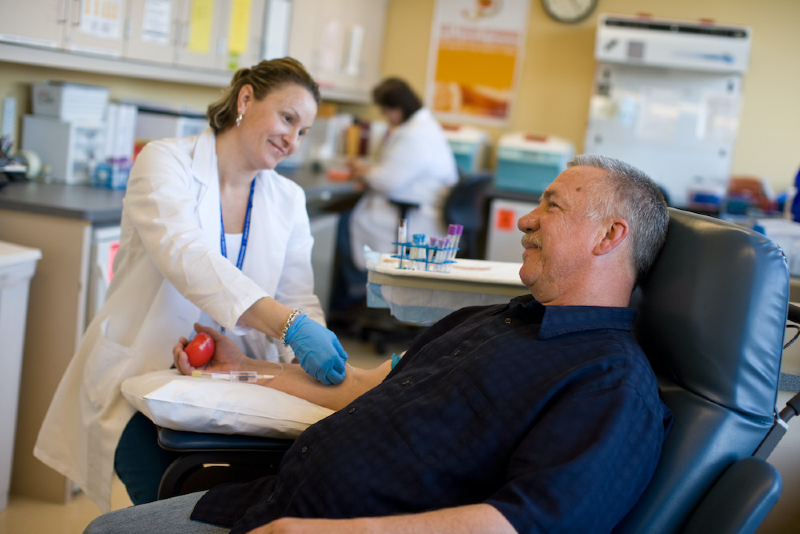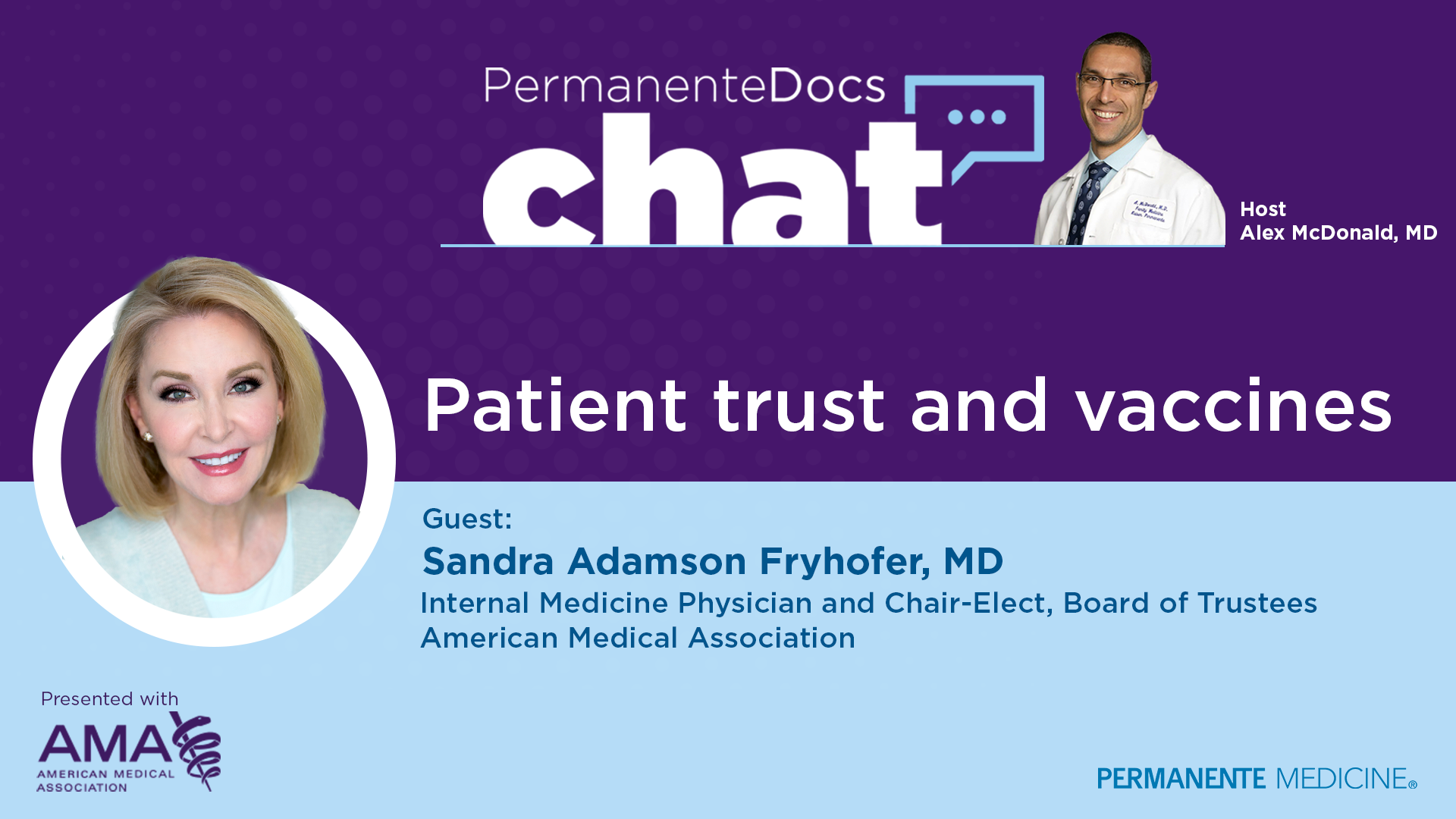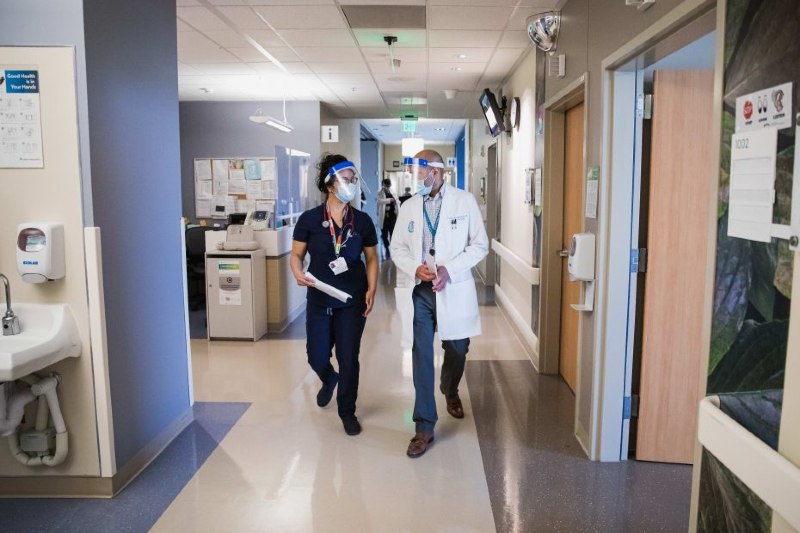PermanenteDocs Chat podcast on flu, COVID, and RSV vaccine safety and effectiveness updates with Sandra Fryhofer, MD, of the American Medical Association.

COVID-19 antibody research to illuminate pandemic’s course
Kaiser Permanente among 25 recipients of grants from National Cancer Institute’s SeroNet program
By Jan Greene
Senior Communications Consultant
Researchers with Kaiser Permanente are launching a study using blood tests for antibodies to the novel coronavirus to estimate the prevalence and incidence of COVID-19 disease in Northern California and explore whether antibodies confer protection from recurrent disease.
Kaiser Permanente Northern California (KPNC) is one of 25 recipients of grants from the National Cancer Institute’s Serological Sciences Network (SeroNet) to explore serology (blood testing) as an alternative window into the pandemic. Up to now, KPNC has relied on nasal swab PCR tests that determine whether a patient has active disease, explains Jacek Skarbinski, MD, the project’s principal investigator and an infectious disease specialist with The Permanente Medical Group (TPMG).
Antibody testing, while not helpful so far in treating COVID-19 patients, can offer new insights about the disease on a large-scale population level. “Serology (antibody) studies are really important as they can identify people who have been exposed to COVID-19, but have not had antibody tests because they did not have any symptoms or did not receive PCR testing. Thus, serology studies can identify all of our members who have been infected with COVID,” says Dr. Skarbinski, an adjunct investigator with the Kaiser Permanente Division of Research (DOR). “It’s very important to understand this larger population of people who have been infected and affected by this disease.”
The KPNC serology project will recruit a representative sample of Kaiser Permanente members to be tested for antibodies repeatedly over time. A second part of the project will enroll people who are positive for the novel coronavirus either through a PCR or antibody test and follow them with repeat testing to determine what proportion of people with active disease develop antibodies and how long the antibodies last.
A third prong will be data analyses (with no additional testing) from the large number of Kaiser Permanente Northern California patients who have been tested for the virus with either PCR or antibody tests since March. Researchers will look for initial infection and reinfection among those who tested positive, as well as development and persistence of antibodies for those who have clinical tests for antibodies. They’ll also search for risk factors – such as cancer, cancer treatment, or chronic illness – for developing COVID-19 disease or recurrence, taking advantage of the detailed electronic health records available for Kaiser Permanente members.
We’re perfectly set up here at Kaiser Permanente to do this kind of work because we have a very large number of people who we can follow longitudinally through the electronic health record.
– Jacek Skarbinski, MD, principal investigator
The researchers hope to learn whether antibodies confer protection against recurrent COVID-19 and what risk factors might be involved for people who aren’t protected by the antibodies. “We’re perfectly set up here at Kaiser Permanente to do this kind of work because we have a very large number of people who we can follow longitudinally through the electronic health record,” Dr. Skarbinski says.
The project has two DOR co-investigators: Lawrence Kushi, ScD, DOR’s director of scientific policy and a cancer epidemiologist, and Doug Corley, MD, PhD, a DOR research scientist and practicing gastroenterologist who is TPMG’s regional director for Delivery Science and Applied Research. “The ability to leverage the KPNC system to both investigate changes in population prevalence of antibodies and to examine risk factors for persistence or reinfection is unparalleled,” says Kushi.
“This study can evaluate so many key questions: who is getting infected, how infection exposures vary geographically across KPNC, do antibody responses persist or fade, and how do people with antibodies respond as regarding risk of re-infection,” Dr. Corley says.
The project runs for 5 years, and its aims may evolve over time along with the disease. “COVID-19 moves so incredibly fast, it’s hard to predict what will be interesting 2 months from now, let alone 2 years from now,” Dr. Skarbinski says. “We may need to retool in a couple of years to look at the effects of vaccination.”
Though the project has a long time horizon, the investigators expect some results fairly quickly. “By June 2021 we should have a pretty decent prevalence estimate for our population,” Dr. Skarbinski says. “We aim to be able to produce estimates close to real time so we can add that to our regional dashboard for pandemic planning.” The researchers will be able to provide robust estimates of COVID-19 prevalence by age, community, and racial or ethnic background.
Along with the grant from NCI, the project is supported by the TPMG-DARE program’s Delivery Science grants and its Physician Researcher Program.
Jan Greene is a senior communications consultant with the Kaiser Permanente Division of Research in Northern California. This article was originally published on the Division of Research website.

